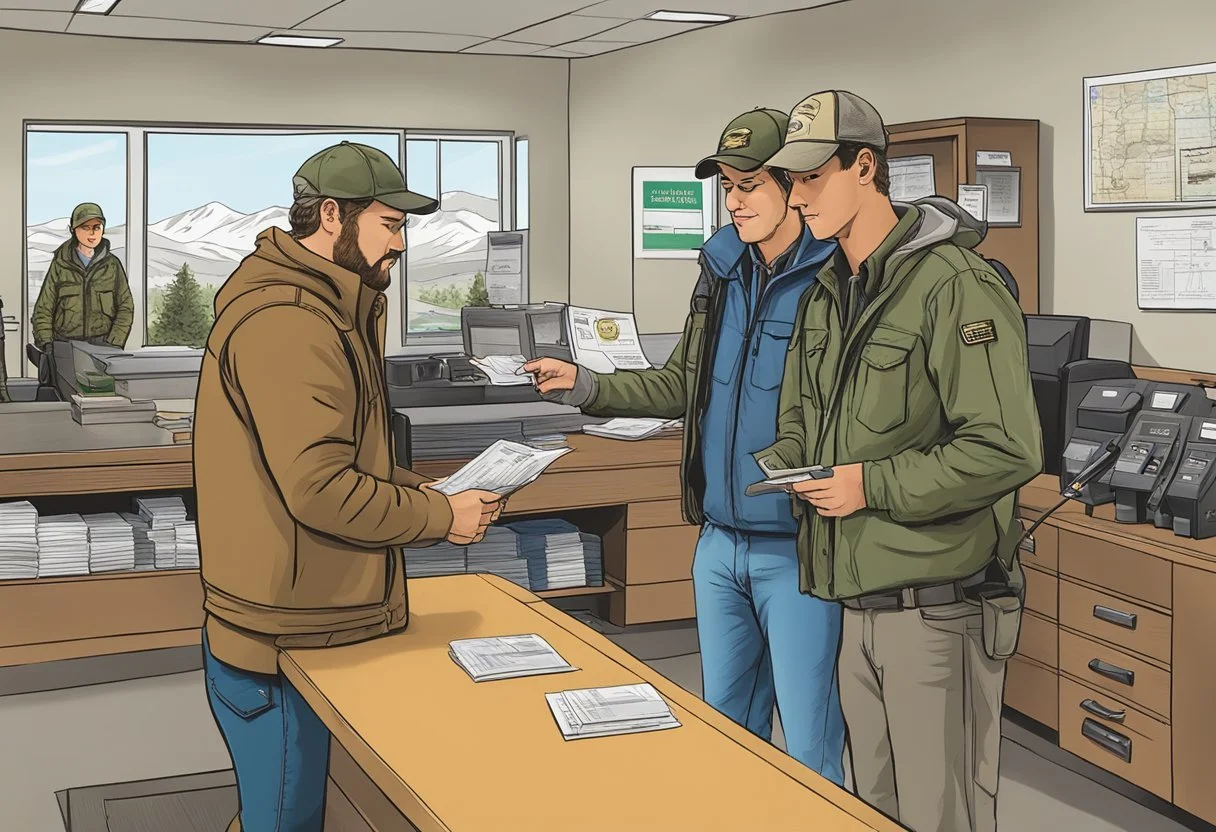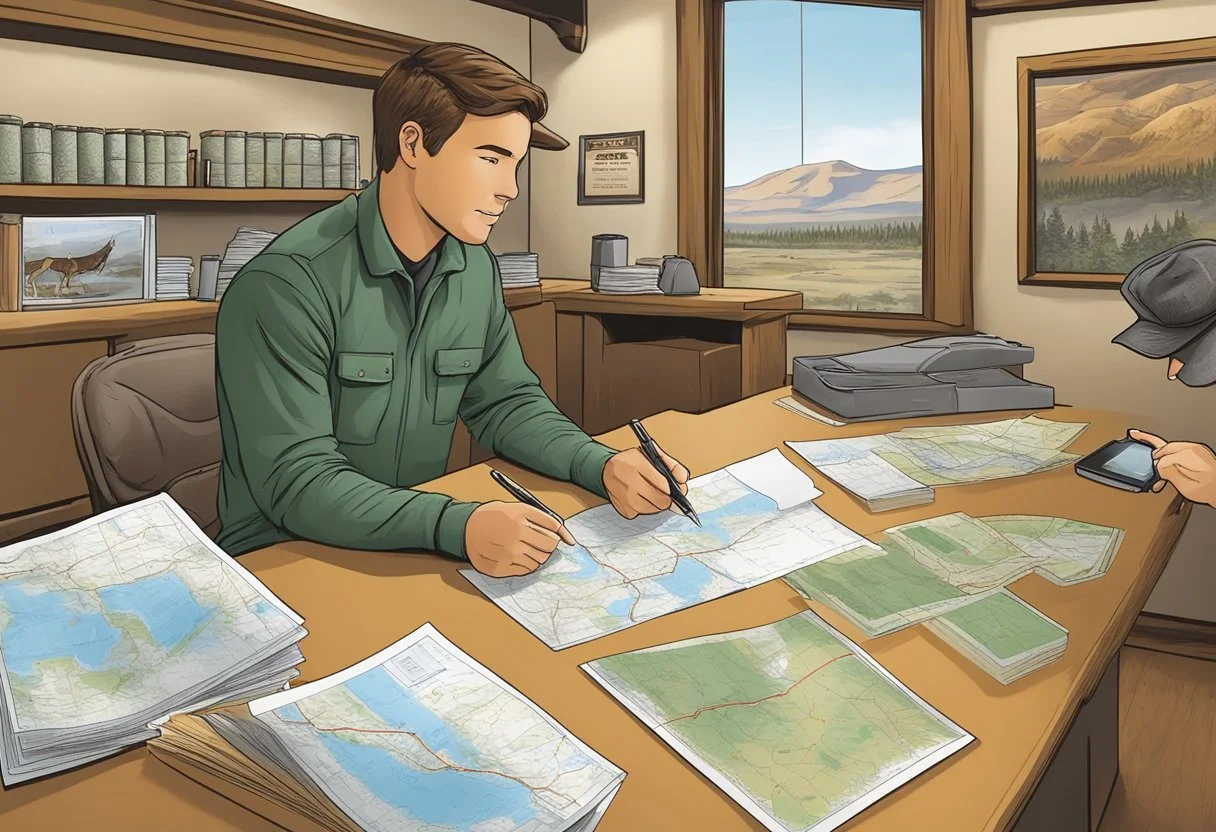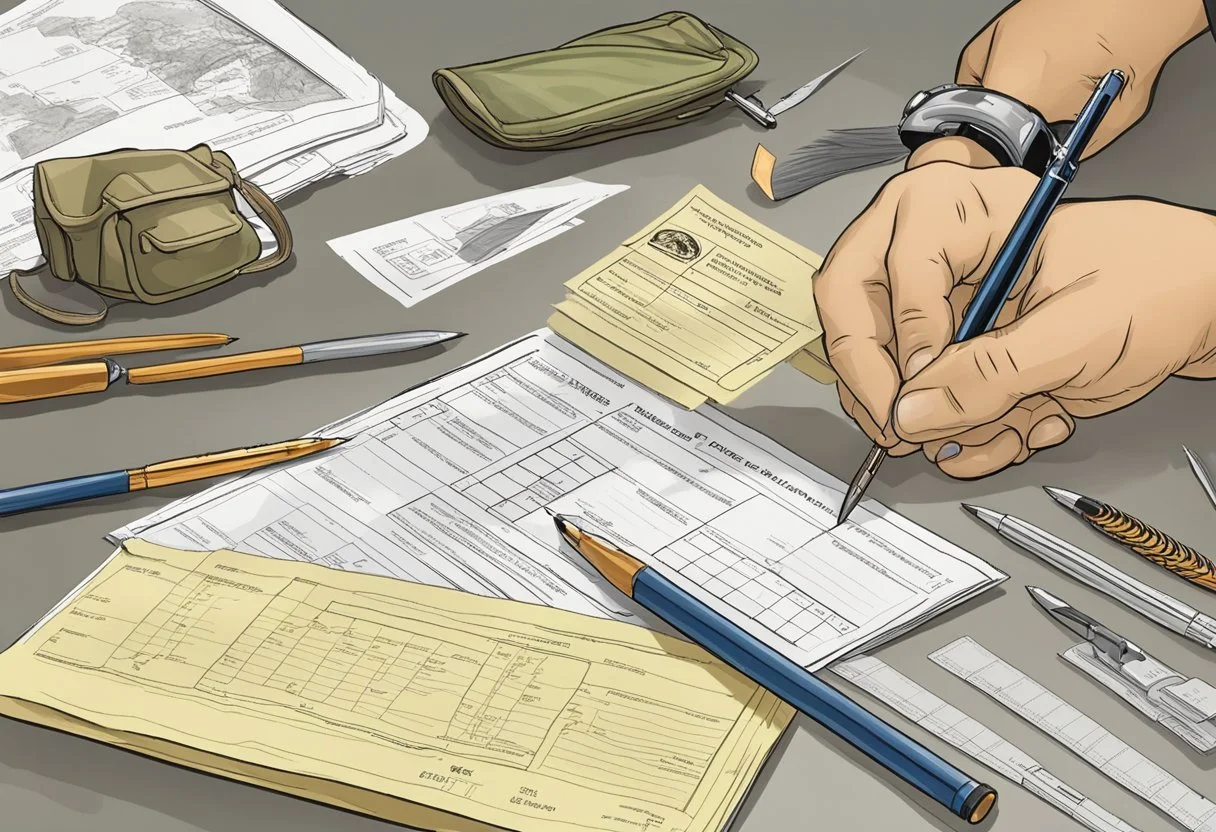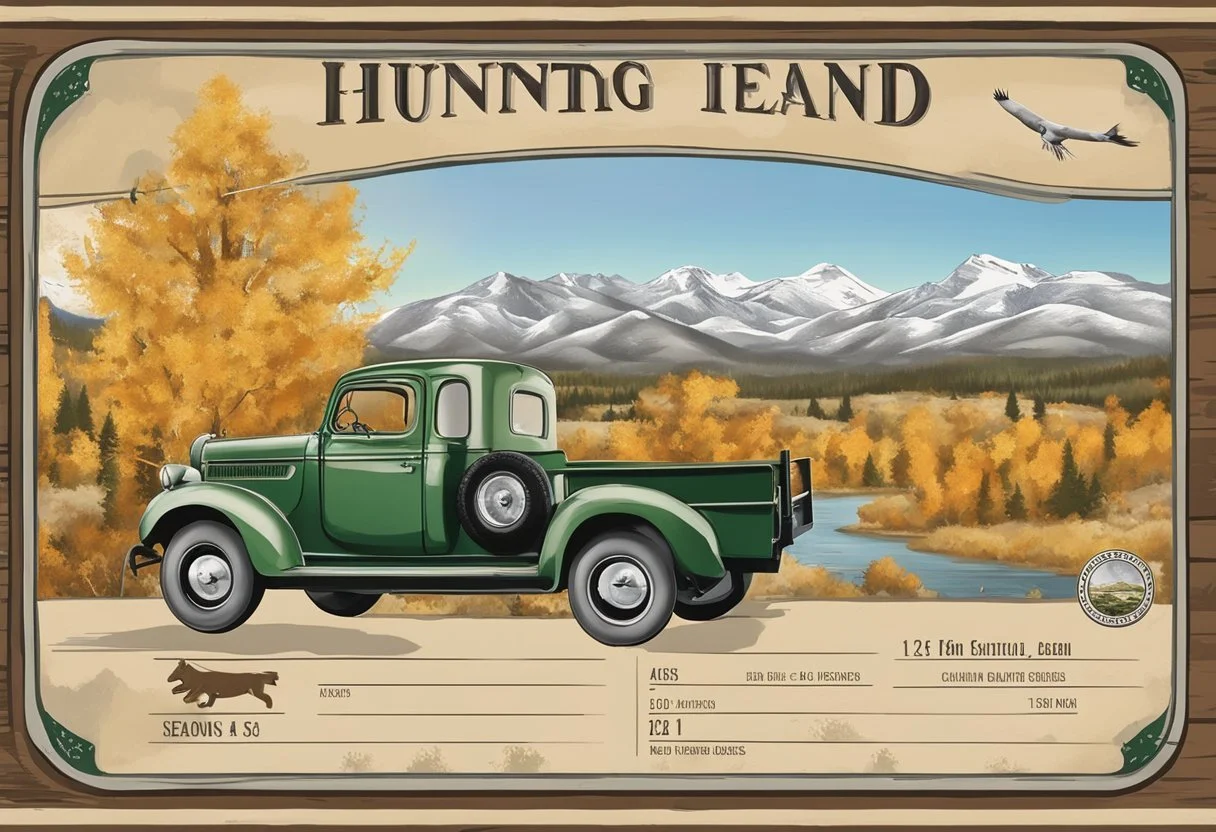How to Get a Idaho Non Resident Hunting License
Your Guide to Out-of-State Hunting Regulations
This Article is Part of Our Guide to Non Resident Hunting Licenses by State
Idaho offers a plethora of hunting opportunities to non-residents, affording them the chance to experience the diverse wildlife and scenic landscapes that the state is known for. Non-resident hunters looking to partake in Idaho's hunting seasons are required to obtain an appropriate license, tag, or permit. The state of Idaho has structured regulations to manage wildlife populations sustainably, and these must be observed by all who wish to hunt within the state's borders.
The cost of licenses, tags, and permits varies, and non-residents should be aware of the different fees associated with hunting in Idaho. An important aspect to note is that all annual hunting, fishing or trapping licenses include a Depredation Management/Access fee. It's pivotal for non-resident hunters to understand the details concerning the sale of deer and elk tags, which become available each year on December 1, and to recognize that hunting licenses are nonrefundable.
For non-resident hunters under the age of 14, regulations allow them to fish under the license of an accompanying adult; however, they also have the option to purchase their own license if they wish to have their own fishing limits. Certain special fishing permits may be required for specific activities, adding another layer to the pre-hunt preparation. By adhering to the state's guidelines, non-resident hunters can contribute to the conservation efforts in Idaho while enjoying a fulfilling hunting experience.
Understanding Idaho Non-Resident Hunting Licenses
Idaho's hunting licenses for non-residents allow for a variety of game pursuits, with specific tags and permits for species like deer, elk, mountain lion, turkey, and bear. The state employs a system to manage wildlife resources sustainably while offering hunting opportunities to non-residents.
License Requirements and Eligibility
Non-residents must obtain a hunting license to legally hunt in Idaho. Eligibility hinges on not being a resident of Idaho; non-residents are anyone who has not lived in Idaho for a set period before purchasing a license. Age classifications for hunting licenses include adult and junior mentored, defined as individuals aged 10 to 17 years. In addition to the standard licenses, Disabled American Veterans (DAV) from out of state can acquire special DAV deer and elk tags under certain conditions.
Different Types of Tags and Permits
Non-resident hunters can select from a variety of tags, which are species-specific. General season tags are available for popular game like deer and elk, including a white-tailed deer tag. Quotas apply to certain tags, and it's important to note that these can sell out quickly. Permits for other species, including bear, turkey, and mountain lion, are also part of the non-resident hunting framework in Idaho.
Pricing and Fees
The cost structure for non-resident hunting licenses is straightforward. The fees differ based on the type and duration of the license. For example:
Non-Resident Hunting - Adult: $185.00
Hunting - Adult - 3 Year: $551.50
Hunting - DAV: $31.75
Hunting - Junior Mentored: $91.75
These prices reflect the necessary payment for a non-resident to be permitted to hunt in Idaho, not including the additional fees for specific tags and permits required to harvest game. It's crucial for hunters to factor in the total cost, including all tag and permit fees, to plan their hunting trip finances.
How to Purchase a Non-Resident Hunting License
Acquiring a non-resident hunting license in Idaho is a clear process that can be completed online, over the phone, or in person. With multiple options available, applicants can choose the method that best suits their needs.
Online Application Process
To apply online, one should visit GoOutdoorsIdaho.com or use the Idaho Fish and Game mobile app. The steps are straightforward:
Create a customer account.
Select the desired license and add it to the shopping cart.
Complete the transaction and ensure a purchase confirmation email is received which confirms the license details.
During periods of high demand for tags, a virtual waiting room system may be in place to manage the load, which provides a real-time tally of available licenses and helps to prevent system slowness.
Phone and In-Person Options
For those who prefer to purchase their license via phone, the number to dial is (800) 554-8685. Purchases can also be made in person at any license vendor location or Fish and Game regional office. When buying in person, ensure to provide your mailing address for the license to be sent to you.
Virtual Waiting Room System
When applying online, especially for popular tags, the virtual waiting room manages access to the system to alleviate long waits and reduce panic buy scenarios. An applicant is placed in a queue and granted access in turn, making the process fair and orderly.
Creating an Efficient Application Strategy
To streamline the process, one should:
Sign up for Idaho Fish and Game's social media channels and email distribution list for updates on availability.
Have all necessary personal information and payment methods ready before beginning the application.
Be aware of peak times and consider applying outside of these periods to avoid delays.
By following these guidelines, applicants can efficiently secure a non-resident hunting license in Idaho.
Guidelines and Regulations
In order to partake in hunting in Idaho as a nonresident, one must adhere to a comprehensive set of guidelines and regulations designed to ensure sustainable wildlife management and hunter safety. These include understanding the specific rules related to big game, the importance of knowledge about hunting units and zones, and the mandatory hunting education and certifications.
Understanding Big Game Regulations
Idaho's big game regulations are intricate and tailored to preserve the state's wildlife populations. For nonresident hunters, big game species such as moose, bighorn sheep, mountain goat, deer, and elk are governed by these regulations. Individuals must familiarize themselves with seasonal constraints, which dictate when one can hunt, and harvest quotas, which limit the number of animals that can be taken.
Hunting Units and Zones
Each species is assigned to a Game Management Unit (GMU) or Elk Management Zone (EMZ), which delineates the geographical areas where hunting can occur. It's essential for hunters to:
Identify the appropriate unit or zone for the species they intend to hunt.
Recognize that some zones, like the Capped Elk Zone, have limits on the number of tags available.
Understand that permits and tags may vary between general season hunts and controlled hunts.
Hunting Education and Certifications
Before obtaining a hunting license, nonresidents must provide proof of completing a Hunter Education Certification. Additionally, for archery hunts, an Archery Certification may be required. These programs cover:
Safety protocols
State-specific wildlife laws
These certifications are vital in promoting responsible hunting behavior and ensuring that nonresident hunters are equipped with the necessary skills and knowledge to hunt legally and safely in Idaho.
Special Opportunities and Considerations
For nonresident hunters in Idaho, distinct opportunities and considerations are available that cater specifically to Disabled American Veterans (DAV) and younger audiences interested in hunting. These programs are designed to offer improved accessibility and foster the next generation of ethical hunting practices.
Nonresident DAV Opportunities
Nonresident Disabled American Veterans may be eligible for special deer and elk tag opportunities in Idaho. To qualify, they must demonstrate a service-connected disability. These tags are part of Idaho's acknowledgment of the sacrifices made by members of the armed forces, offering a form of restorative recreation through hunting.
Eligibility: DAV deer and elk tags
Must have a service-connected disability
Availability: Limited in quantity
Issued on a first-come, first-served basis
Youth and Junior Mentored Hunting
Idaho encourages young nonresident hunters through its Youth and Junior Mentored Hunting programs, promoting responsible hunting traditions. These initiatives are aimed at fostering a safe, educational environment where skills can be honed under the guidance of experienced mentors.
Youth Hunting: For hunters aged 10 to 17 years, nonresident licenses are available.
Youth hunters must be accompanied by a licensed adult hunter.
Junior Mentored Hunting: Specifically tailored for beginners to learn from a seasoned hunter.
Focuses on ethical hunting practices and conservation principles.
Youth participants gain firsthand experience in the field alongside a supportive figure, ensuring a positive introduction to the world of hunting.
Technical Tips for a Smooth Application
For nonresidents applying for an Idaho hunting license, navigating the digital landscape efficiently is crucial. Here are technical guidance steps to ensure a seamless experience through the various platforms offered by the Idaho Department of Fish and Game.
Website Navigation and Account Setup
For first-time users, setting up a customer account on gooutdoorsidaho.com is a vital step. Ensure all information is entered accurately to avoid processing delays. Users should clear their browser cookies and cookie history before starting, as this helps prevent issues that may arise from outdated or conflicting data. If someone is using multiple devices, it is recommended to perform the account setup on the same device they plan to use for the application to avoid synchronization problems.
Device and Browser Recommendations
Application success can be influenced by the choice of device and browser. It is recommended to use a desktop or laptop for the application process as they tend to have more stable internet connections. Ensure the browser is updated to the latest version for improved security and functionality. Adjust browser settings to enable cookies, as disabling them could interfere with the ability to save progress or complete transactions. For increased privacy, individuals can apply using privacy mode or incognito mode, but note that this may affect session persistence.
Using the Idaho Fish and Game Mobile Apps
The Idaho Fish and Game Department provides iOS and Android apps that allow hunters to apply for licenses directly from their mobile devices. Ensure that the app is the latest version, as updates can resolve previous issues and provide a smoother application process. When using the apps, applicants should be connected to a reliable Wi-Fi network as mobile data connections can be inconsistent.
Remember, having a valid Idaho hunting license is a prerequisite for applying for any controlled hunts, and using the official Idaho Fish and Game mobile apps or their website are the official channels for secure transactions.
Additional Hunting Opportunities and Combos
Idaho invites nonresident hunters to partake in a variety of hunting and fishing experiences through its diverse licensing options. From combo licenses that pair hunting and fishing to specialized controlled hunts, Idaho's licensing system offers flexibility for outdoor enthusiasts.
Fishing and Combo Licenses
Nonresidents in Idaho can enhance their hunting trips by exploring the state's abundant fishing opportunities. Fishing licenses are available for adult and junior anglers, with options extending to three-year terms for added convenience.
Combination Licenses - Hunting and Fishing:
Adult: $264.00 (Single Year), $788.50 (Three Year)
Junior (14-17 yrs): Price varies, includes both hunting and fishing rights.
The combination licenses provide significant value for those wishing to engage in both activities during their stay in Idaho. With rivers teeming with salmon and steelhead, a combo license allows hunters to potentially return home with both big game and fish.
Controlled Hunts and Other Species
Idaho also offers nonresidents the chance to participate in controlled hunts for species such as mountain lion, turkey, and bear. Unlike general season hunts, controlled hunts have specific tag quotas, ensuring sustainable wildlife management.
Controlled Hunt Tags are obtained through a lottery system, separate from standard licenses.
Other Species and Methods:
Bear
Turkey
Mountain Lion
For those interested in traditional methods, dedicated muzzleloader tags are also available.
These controlled hunts provide a unique challenge for hunters seeking a more regulated hunting experience, with the added benefit of potentially lower competition for game. Hunters interested in these tags should be mindful of the application deadlines and quota limits.
Staying Informed and Connected
When pursuing hunting licenses in Idaho as a nonresident, staying updated on tag quotas and leveraging social media and communication can create a significant advantage.
Social Media and Communication
Nonresidents can stay connected with Idaho Fish and Game through various social media platforms such as Facebook, Twitter, and Instagram. Through these channels, Idaho Fish and Game shares updates on tag quantities, important deadlines, and relevant news for hunters. Additionally, individuals may sign up for an email distribution list. This direct line of communication ensures nonresidents receive timely information, including any changes that could affect their license procurement or hunting plans.
Facebook/Twitter/Instagram: Quick updates, news alerts, and community engagement
Email Distribution List: Detailed information and important notices directly to your inbox
Tag Quotas and Availability Updates
The number of hunting tags for nonresidents is controlled through set quotas to manage wildlife sustainability. Idaho Fish and Game keeps hunters informed with a real-time tally of available tags, ensuring hunters are aware of their chances to secure a permit for popular tags. Nonresidents can access this information through the Idaho Fish and Game's website or their mobile applications. Nonresident tag quotas are especially crucial, as these tags are often in high demand and tend to sell out quickly.
Real-Time Tally: Current availability of deer and elk tags for nonresidents.
Popular Tags: Updates on fast-selling tags to plan purchase timing efficiently.
Historical Context and Future Seasons
The demand for hunting tags in Idaho reflects a growing interest in wildlife recreation, and the Idaho Department of Fish and Game (IDFG) adapts to these changes with evolving policies. Plans are in place to manage the 2024 seasons and beyond, ensuring sustainability and fair access.
Insights into Tag Demand Over Time
Idaho has seen a consistent increase in demand for nonresident hunting tags. Historically, the IDFG has allocated a certain quota for nonresident hunters, which often sells out quickly due to high demand. To illustrate, for the 2023 hunting season, a specific number of elk and deer tags were made available, with caps instituted in certain zones to control hunter density.
Year-over-Year Tag Quotas:
2023: Elk (12,815 tags), Deer (15,500 tags)
Previous Years: Gradual increase in tag allocation corresponding with demand growth.
Planning for the 2024 Hunting Season and Beyond
For the upcoming 2024 hunting season, nonresident tags are available for purchase beginning December 1, 2023. This includes a quota for elk and deer tags, with separate provisions for general tags and tags allocated to outfitters. The IDFG has implemented systems to facilitate sales, such as online platforms and phone lines to accommodate the expected influx of applicants. Resident tag sales periods are also managed to prioritize local hunters, and options like lifetime licenses continue to be popular.
Available Sales Channels:
Online: GoOutdoorsIdaho.com
Mobile Apps: iOS, Android
Phone: (800) 554-8685
Residents can avail tags during a separate sales period before nonresident sales open, ensuring residents have fair access. Looking forward, the IDFG may consider regulatory changes such as fee adjustments or managing nonresident participation to maintain balance in wildlife management and hunter satisfaction.
#IdahoHuntingLicense #NonResidentHunting #OutofStateHunting #HuntingPermits #WildlifeConservation #OutdoorAdvent







